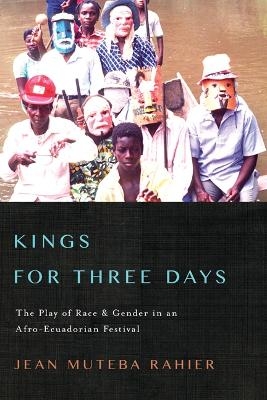
Kings for Three Days
The Play of Race and Gender in an Afro-Ecuadorian Festival
Seiten
2013
University of Illinois Press (Verlag)
978-0-252-07901-6 (ISBN)
University of Illinois Press (Verlag)
978-0-252-07901-6 (ISBN)
A highly detailed, thought-provoking examination of the racial, sexual, and social complexities of Afro-Ecuadorian culture, as revealed through the annual Festival of the Kings.
With its rich mix of cultures, European influences, colonial tensions, and migration from bordering nations, Ecuador has long drawn the interest of ethnographers, historians, and political scientists. In this book, Jean Muteba Rahier delivers a highly detailed, thought-provoking examination of the racial, sexual, and social complexities of Afro-Ecuadorian culture, as revealed through the annual Festival of the Kings. During the Festival, the people of various villages and towns of Esmeraldas--Ecuador's province most associated with blackness--engage in celebratory and parodic portrayals, often donning masks, cross-dressing, and disguising themselves as blacks, indigenous people, and whites, in an obvious critique of local, provincial, and national white, white-mestizo, and light-mulatto elites. Rahier shows that this festival, as performed in different locations, reveals each time a specific location's perspective on the larger struggles over identity, class, and gender relations in the racial-spacial order of Esmeraldas, and of the Ecuadorian nation in general.
With its rich mix of cultures, European influences, colonial tensions, and migration from bordering nations, Ecuador has long drawn the interest of ethnographers, historians, and political scientists. In this book, Jean Muteba Rahier delivers a highly detailed, thought-provoking examination of the racial, sexual, and social complexities of Afro-Ecuadorian culture, as revealed through the annual Festival of the Kings. During the Festival, the people of various villages and towns of Esmeraldas--Ecuador's province most associated with blackness--engage in celebratory and parodic portrayals, often donning masks, cross-dressing, and disguising themselves as blacks, indigenous people, and whites, in an obvious critique of local, provincial, and national white, white-mestizo, and light-mulatto elites. Rahier shows that this festival, as performed in different locations, reveals each time a specific location's perspective on the larger struggles over identity, class, and gender relations in the racial-spacial order of Esmeraldas, and of the Ecuadorian nation in general.
Jean Muteba Rahier is an associate professor of anthropology and the director of the African & African Diaspora Studies Program at Florida International University. He is the coeditor of Global Circuits of Blackness: Interrogating the African Diaspora.
| Reihe/Serie | Interp Culture New Millennium |
|---|---|
| Zusatzinfo | 16 black and white photographs |
| Verlagsort | Baltimore |
| Sprache | englisch |
| Maße | 152 x 229 mm |
| Gewicht | 367 g |
| Themenwelt | Geisteswissenschaften ► Geschichte ► Regional- / Ländergeschichte |
| Sozialwissenschaften ► Ethnologie ► Volkskunde | |
| Sozialwissenschaften ► Soziologie | |
| ISBN-10 | 0-252-07901-9 / 0252079019 |
| ISBN-13 | 978-0-252-07901-6 / 9780252079016 |
| Zustand | Neuware |
| Haben Sie eine Frage zum Produkt? |
Mehr entdecken
aus dem Bereich
aus dem Bereich
Erinnerungen
Buch | Softcover (2024)
Pantheon (Verlag)
16,00 €


